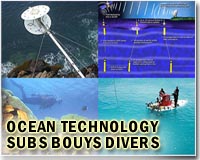| . |  |
. |
Newcastle, UK (SPX) Feb 03, 2011 It may look like an over-grown slug, but scientists at Newcastle University believe the sea cucumber could play a vital role in the fight to save our seas - and become an unusual addition to British gourmet food. Not only is this salty Asian delicacy a rich source of nutrients, it is also an important part of the marine ecosystem. Much like worms working soil in a garden, sea cucumbers are responsible for cleaning up the sea bed - moving, consuming and mixing marine sediments. Used widely in Chinese medicine and cuisine, sea cucumbers are also a rich source of glucosamine and chondroitin which are used in a range of common food supplements. As a result, natural stocks of sea cucumbers are now seriously depleted around the world but at Newcastle University, UK, a team led by Professor Selina Stead is investigating how we might be able to use sea cucumbers to develop a more sustainable way of farming in the sea. Dr Matthew Slater, an expert in sea cucumbers and part of Professor Stead's team, said the aim was to investigate the sea cucumber's potential as a natural, organic cleaner on fish farms around the world - including the UK - as well as a source of food. "We wanted to find a way to clean up waste produced by large-scale aquaculture so that farming activities in the sea have little or no impact on the ocean floor," explained Dr Slater. "By growing sea cucumbers on waste from fish farms we are not only farming a valuable food product and giving the wild sea cucumber populations a chance to recover, we are also developing solutions to fish farming impacts." The sea cucumber project is being unveiled as part of a marine conference being held at Newcastle University. Marking the launch of marineNewcastle, the conference will bring together the university's world-leading expertise in marine science and technology to provide answers for dealing with key challenges facing the marine environment now and in the future. Professor Tony Clare, Newcastle University's marineNewcastle Co-ordinator explained: "This new network is about finding solutions to the major challenges facing our marine environment. "By bringing together world-class scientists from a range of research disciplines, our goal is to find ways in which we can continue to use the seas as a source of food, energy and for transport, but use them responsibly and sustainably so we protect them now and for the future." Until now, the team has carried out most of the work at Newcastle University's Dove Marine Laboratory. The next step will be to introduce the sea cucumbers to fish farms around the UK and farm them as both cleaners and food. As well as looking at the potential for farming sea cucumbers in the UK, the team is also leading a major aquaculture project in Tanzania where animals are being grown in lagoon-based cages in a hatchery built for producing juveniles to support a growing industry. Professor Selina Stead, former President of the European Aquaculture Society, said this important food export can provide a valuable income and a sustainable alternative for people living in the region. "One of the key aims of the project is to find solutions for developing community-led aquaculture in East Africa as a way of tackling poverty," she explained. "Sea cucumbers are fairly simple to farm, they just require clean water and plenty of food in the form of nutrient-rich waste. "Man's impact on the sea has escalated in recent decades and it is vital we work quickly to try to reverse some of the problems we have caused. Key species of sea cucumbers are already dangerously close to extinction unless we pull back now and give them a chance to recover."
Share This Article With Planet Earth
Related Links Newcastle University Water News - Science, Technology and Politics
 Thailand closes dive spots due to reef damage
Thailand closes dive spots due to reef damageBangkok (AFP) Jan 21, 2011 Thailand has closed a host of popular dive sites to tourists indefinitely to allow coral reefs to recover from widespread bleaching caused by warmer sea temperatures, authorities said Friday. In total 18 areas in seven marine parks are off-limits, according to an order by the Thai National Park, Wildlife and Plant Conservation Department. "Diving in all the spots is to be halted indefini ... read more |
|
| The content herein, unless otherwise known to be public domain, are Copyright 1995-2010 - SpaceDaily. AFP and UPI Wire Stories are copyright Agence France-Presse and United Press International. ESA Portal Reports are copyright European Space Agency. All NASA sourced material is public domain. Additional copyrights may apply in whole or part to other bona fide parties. Advertising does not imply endorsement,agreement or approval of any opinions, statements or information provided by SpaceDaily on any Web page published or hosted by SpaceDaily. Privacy Statement |